Issue Number 67, Winter 2024-25
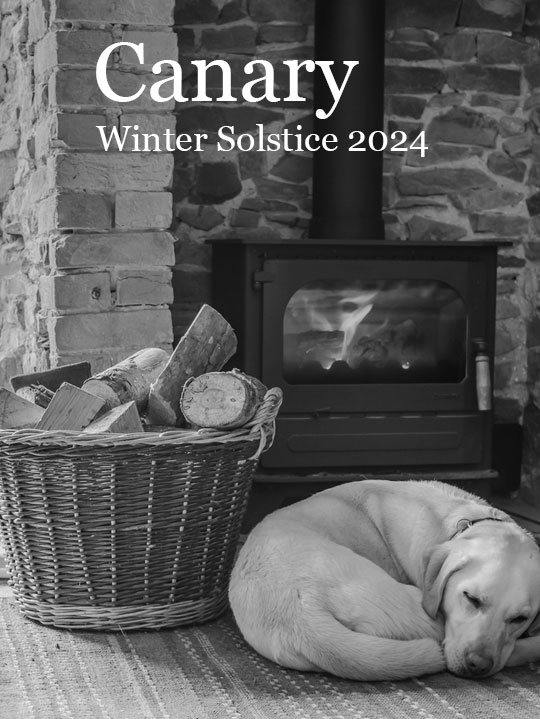
Contents
- 93 Days of Snow by Kim Schnuelle
- Alone by Sally Nacker
- Dinosaurs and IVF or Being Queer and Having Kids in the Apocalypse by Morgan Smith
- Two Minutes by Peter Neil Carroll
- Anthropocene Mascots by Cole Williams
- The Aquarium by Thomas Young
- Feral Dogs of Chernobyl by David Cazden
- Our Maluku Islands : their green revolution by Cordelia Hanemann
- In My Dream, Costello the Octopus Has a Nightmare by Louhi Pohjola
- Ode to Bigelow 224 by Louhi Pohjola
- Daybreak in Atlanta by Richard Lebovitz
- Battered by Carol Raitt
- The Severed Tree by Elizabeth Markley
- Palindrome Beginning and Ending with Lines from Jane Hirshfield by Michelle Miller
- Global Warming Ode by Elizabeth Libbey
- The Horses by Ted Hughes (1930-1998)
- Shoveling Snow in the Driveway by Maryfrances Wagner
- Like Frozen Iguanas in Winter by Ginny Lowe Connors
- On Flourishing in Winter by Heather Sellers
- First Betrayal by Alicia Ostriker
- Lament for the Fog by Gail Comorat
Archives: by Issue | by Author Name
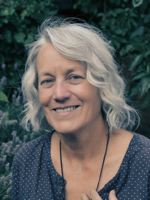
93 Days of Snow
by Kim Schnuelle
Kim splits her time between a small urban bungalow above a branch of the Salish Sea and a high desert converted storage container overlooking the Columbia River. She is unabashedly in love with the great Northwest rain forests and their inhabitants.

The tracks were she-bear,
but their path indecisive.
Heavy in the early frost.
A bent trail of doubt.
Was she bargaining with
her impending slumber,
hoping to delay
a begirded sleep
to harvest those stars I saw late
last night from the side window?
Blue and winnowed,
as they careened past
the shaking alder boughs.
Wagering now, that bear.
Her seduction forsaken,
a refuge spurned,
for another midnight breeze
full of wonder
through her slanted ears.
The tired Ponderosa fell
on a December’s new moon
after a sudden and most feral tempest.
It shook the dishes, spilled the coffee.
I crossed myself from instinct.
But it was early then,
when omens
were still fairy tales
and not yet
fallen giants.
Ultimately a relief,
I thought in envy, priming the stove.
To let go and lie on the earth
once more.
The barred owl plunged swift,
snow-rimmed crater burst skyward,
a dormouse, supplicant and yielding,
in her blackened talons.
See, there is no hiding, I reckoned.
As the most vigilant of eyes,
even the cloaked dormancy of ice,
is no armament
against the ways of providence.
And in time,
Winter came for me too.
Her pale winds ascending,
dragging my regrets and lost dreams aloft,
loose into the doleful sky.
Inescapable,
the snow became my breath,
turned glacial and wordless in annihilation.
Then there was no future.
Only a whitened melding.
Elk circle the laden conifers.
A swirl of comets and pole stars.
And finally this marvel, this oblivion,
this amazement of ruin
that binds my body to this place.
Shouting wide to the bones and benefactors
that I am here.
Shouting, ecstatic, to us all
that at last
we are here.
© Kim Schnuelle

Alone
by Sally Nacker
Sally lives a quiet life in a small house in the woods of Redding, Connecticut, part of the Norwalk River Watershed. Here one finds wetlands, streams, ponds, trees, the Norwalk River flowing south to Long Island Sound, and wildlife.

Alone, pausing to appreciate
the snow, I hear a train— its whistle blow—
in the near distance. The sound
through falling snow, through white
air (even in rain I have heard it so),
a carving through the atmosphere
like string music, or nostalgia. And I
so small here in the wood,
inside the sound inside the snow.
Previously published in One Art
© Sally Nacker
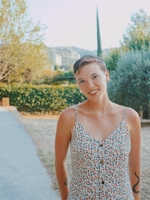
Dinosaurs and IVF or Being Queer and Having Kids in the Apocalypse
by Morgan Smith
M. Rose writes in the desert— for now. They are surrounded by saguaros and cactus wrens, big blue skies and sunlight so bright, it turns everything a washed-out shade of white.

In two organs the size of a walnut, I have 200,000 eggs. They have lived inside me for longer than I have lived. Since I was, according to the internet, the size of a grapefruit, a banana, a troll doll. Then, at 20 weeks old, there were 7 million of them, a New York City’s worth of half-me’s, midtown and skyscrapers and crisscrossed bridges, commutes and matinees of me’s, snowy-window Christmas dinners of me’s, a tableful of me’s at Sardi’s, waiting for the review of my new play, written by my worst critic— me. It is this image that ashes through my mind the first time you make a joke about how much sunscreen our kids will need, the laughter, and then the realization. That our children will be ours, ours, but not made of the two of us. A New York City’s worth of me’s pressing their faces to the glass, seeing only a reflection. A city of faces looking out and seeing nothing.
20
weeks. When I was halfway through becoming a being that could breathe air and open my eyes, I carried already these 7 million possibilities, floating in the natal darkness of a woman in a small wintery town. For twenty weeks, it was all of us in there, considering whatever was to be considered then. Once, I was one of 7 million possibilities my mother held, as my grandmother held her. And so it goes, back and back, and in this way, we have all known countries we never set foot in, lived fights we didn’t flinch from, dreamed, inside a dream, inside a dream.
160
million years ago, the dream begins, just as Pangaea begins to drift apart. It begins in Jurassic-era China, with a shrew named Juramaia. At just under three inches long, the average size of a man’s thumb, or the size of a bumblebee hummingbird, Juramaia is the first mammal to give birth. She does this alone, in a burrow, without knowing what will happen to her.
65
million years ago, the Maiasaura lives in what is now called Montana. She is an elegant dinosaur, with a long, sloping neck, a broad mouth, often greened and pollen-dusted from grazing on wildflowers, and wet, soulful eyes. This is an embellishment on my part—we cannot actually know what the dinosaur's eyes looked like. But Maiasaur was a plant eater, a herd animal, the aunty-in-spirit of the cow, the deer, the manatee. I don't need a fossil record to know she had kind eyes.
185
million years ago, a mother is in Arizona. She is Kayentatherium, a thing between many things. A mammal-like reptile, or reptile-like mammal. Semi-aquatic. Semi-mammalian. We know that she loved to swim. To climb the arches. Maybe to look at the sky. I tell myself I know her, because I too live here and love those things. When we find her, 185 million years later, it is from her footprints. Too deep in the mud, trying desperately to escape a rising river. Too deep, for her bodyweight. Too deep, we know, once we find the body, because she died carrying her 38 babies on her back. I realize I don’t know her at all.
5
years ago, you and I have the first conversation about children. It is mostly a catalogue of maybes. Maybe we want them, maybe we don’t. Maybe we couldn’t afford them. Maybe we could. Maybe we want to stay forever this way, coming and going as we please.
30,000
dollars. The price of in-vitro fertilization. In-vitro, In Vitrum, in glass. The fragile weight of a vital future and the price of clarity.
4
years ago, we wonder. What if you carried them. What if I did. What if they inherited your headaches, your grandmother’s cancer. What if we used my genes. What if we couldn’t afford it. What if we saved. What if we couldn’t save them from what was coming.
65
million years ago, Maiasaura is living in a green valley, near what will someday be called Choteau, Montana. She has never seen a human being, and we will never see her, because one day (before there are days of the week, or even months, when the sun and its turning really is the only calendar), one day, an asteroid the size of Mount Everest will careen into the Yucatán Peninsula going 100,000 kilometers per hour, releasing a detonating force equivalent to 10 billion atomic bombs.
1.7
million years ago, a hand— fingers that could clasp mine, the instep of a wrist I would recognize— finds fire. Finds fire the way one might say you find yourself. The discovery of something that has always been there, waiting to be known. We find fire. The bomb, again.
1712
A man named Thomas learns about re. Coal, and combustion, and steam, and movement. He says the word engine, runs his hands along the black seams of history and makes choices. He dreams to life a world of ships like skywhales and skies emptied of stars. Or perhaps he simply dreams dinner, bed, wife. I am inclined to believe the best, even if I know the ending.
300
million years ago, swamps swath the world in a wet embrace, and mosses tall as trees lay down and dream of Thomas.
37
billion tons of carbon, this year alone, but I struggle to imagine it. 37 billion tons of carbon, from
52.86
billion tons of coal, from forest land, from what was once
550,625,000
square miles of forest, covering roughly
2.797
Earths.
I still can’t imagine it.
2020
When we talk about children— over breakfast eaten on the floor, watching nature documentaries, in the car on the way to wait, masked, in the parking lot of a grocery store, in bed, in the dark, in the silences between passing cars, what we come back to is this: how can we bring them into this world.
This world in which Australia burns, California burns, Russia burns, this world in which I call myself an environmentalist. I’m a vegan. I take the bus. I recycle. But there’s still a part of me, the part of me nestled close to my granny’s granny’s granny, that looks at you and wants to know what your eyes would look like, gazing up from a little potential. Our maybe. A baby who is already contained in me, or you, but who cannot be in both of us. And yet, a baby that is still possible, the doctors say. The strangeness of it all, to be the rst of our kind. A new plot point on the evolutionary tree. Our generation, the first to be able to dream of this glass-creation, this reflective intervention in what is simple for everyone else. Our eggs in a nest of reflection, our me’s staring out the window, our faces pressed against the glass. Unimaginable to the past. One hundred years ago, or eighty years ago, or fifty years ago, it would not be possible, what we are considering. The choice we have available. And there is no question: for us, it is a choice. We are not afforded the luxury of an accident.
667
trees. Per person. Per year. 667 trees breathing away on a mountaintop somewhere, to drink in the effects of our life. Our trips to the movies. Our avocados. Our doctors’ appointments. What do I say to that. What is a maybe worth. What are 667 trees worth. What am I paying with. How far do I sit from the end of the dream. How long until the re goes out.
∞
time. Mythic time. Time not as a line, but as a fabric, your sweatshirt bundled up and tossed in the corner. As liquid, the teacup at your bedside. As present, as in gift, as in I am bumping into you the night we met, I am sleeping, always on the left, I am walking down the aisle again, and again and I am in kindergarten, saying I don’t know what I want to be when I grow up yet, but that I still have time. As cycle, you bleeding then me, me bleeding then you. As spiral, the pattern on the belly of the tadpoles I saved from puddles when I was still close enough to my mother to remember darkness. Time as again, and again, and again. Am I willing to be an ending.
In mythic time, I am already being eaten. I have crawled into the nest of a grave, I am smiling to the earthy stars with a mossy tombstone of herbivore teeth as worms learn the crests of my body. I am at peace, finally, already, just glad to be of use. To stop consuming. The worms learn me, as you once did.
In mythic time, the ghost of Maiasaura is in my t-shirt. It makes sense that we are all made of each other. I drive to a doctor’s appointment, the engine a swarm of plankton and the deep places of the earth, re.
In mythic time, my question is no question. There is just the stretch in all directions, an unbroken line, not straight, but stitching, bringing me together again and again with all my thanksgivings, giving thanks to Juramaia, to Westlothiana, to Icthyostega and Agnatha and Cyanobacteria. Thank you for lungs, I say as the asteroid looms. Thank you for teeth. For hips. For blood, for bleeding. For sight and all the things we see. Thank you, living breathing endless pieces that brought me to this maybe. The world is burning.
43
nests. In a valley in Montana, there are 43 nests.
We know about the Maiasaura, because of the picture they left us. The Pompeian lovers. The moment of impact. 43 nests, raised berms of earth in perfect circles. Inside them, eggs. Delicate. Unbroken. Eggs, complete with translucent, unfinished bones inside, even though
65
million years ago, a stone breaks the silence. Craters the earth. It is heard around the world, ash of light, wall of water, rock-strewn sky. A curtain of re crosses the continent faster than a fighter jet, arrives, less than an hour later, at the Maiasaura and her nest.
43
Maiasaura climb atop the small craters, the berms, their worlds. They lay down, smooth bellies to the earth. Above, stones re-enter the atmosphere at speeds faster than the fastest bullet we have created, it begins to rain re. But to the little ones— with the cool, familiar bulk of their mothers between them and the world, the known darkness of the nest, the pattering of this fiery rain thrumming through the earth— to them, it feels no different than a summer thunderstorm. Seems, for the longest time, as though it will pass.
2023
We have already chosen names, though I don’t know if we will use them.
65
million years later, a Paleontologist finds them, hundreds of them, the first dinosaur eggs to have survived the weight of the world ending, time and time again. They wonder at the sight of the unbroken shell, the smooth marvel of an ending and a beginning, the way you can hold an unfulfilled potential in the palm of your hand. They debate genus, species, phylum, and in the end, a name is chosen.
They name her Maiasaura. The good mother.
© Morgan Smith
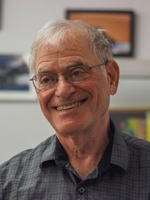
Two Minutes
by Peter Neil Carroll
Peter Neil Carroll lives in the foothills east of Half Moon Bay where the wind off the Pacific keeps the heat waves away.

She married
on the twenty-second day of December,
pleased to begin at the birth
of the solar cycle
that extended light by two minutes
each day—one in the morning by her watch,
one in the evening. Each day
extended, each a little lighter and maybe
if the sun could be trusted
a little warmer. She knew
that was unlikely but why not
hope against doing nothing.
Once while standing at an open window
during a thunderstorm
lightning glanced off a brick wall
hit the spoon in her hand, saved
from any mark by its wood handle.
She had reason to fear darkness
of the short days.
Her marriage encouraged more hope.
She’d been born on an American holiday,
her immigrant parents unsure which one—
Lincoln’s birthday, Washington’s birthday—
but when she found her birth certificate
it showed the fourteenth day of the second month,
Valentine’s Day. No one forgot her birthday.
Every year I bought my mother
a heart-shaped box of chocolates.
Time passed: her sister died young.
Her husband died young. She continued—
—eighty, ninety—still driving a car,
shopping, winding her clocks. Days got shorter,
days got longer. Her two minutes
came or went each day. On a day of
weak sunlight, her body rounded
the solstice circle, December 21.
© Peter Neil Carroll

Anthropocene Mascots
by Cole Williams
Cole lives amid the sandy soils and coastal shores in the Gulf of Mexico on Pine Island, the largest barrier reef island of southwest Florida.
Photographer Dmitry Kokh shoots polar bears in buildings
with a camera.
I am looking at photos of polar bears
in buildings.

These polar bears with their cuteness. Who did that to them? The cuteness. The 80's. The prolific christmas bear I coveted and hugged to death. Mine without clothing so I gave him an earring.
A woman from a summer writing workshop would send us links through the chat every time someone tip-toed too close to being an awful person.One link was to an article about disaster porn and had the parable of something akin to: you better not like disaster or you're exploiting the vibrancy of a place with implied socio-economic burdens that led to the eventuality of ruin. I’ve never heard disaster porn before this link was sent out and I thought on it for some time:
Photo one: A dying yellow building, a weather station on Kolyuchin Island, an innocent polar bear challenging our gaze—arms rested on the broken windowsill, paws flapping easily in front saying Sunday morning and nothing to do; and look ever so closely a bit further down: is it a slight raise of the middle digit, upside down to the cameraman?
Photo Two: A video shot of a polar bear hanging its head out of a broken window in an abandoned home. He is forlorn. She is too. She is at the door. He has no fish. She burnt the pie. He went to go get a new piece of glass cut but the hardware store was closed.
Photo Three: The couple welcomes you to their home. We can ascertain from this photo that polar bears climb stairs, and once inside most likely prefer the sofa, like us. If I close my eyes I see them wearing slippers and reading glasses.
I have loved distorted and decaying ruins my entire life. Our friend group back in the day, led by a fearless and intrepid leader, would regularly trespass into all sorts of out-of-bounds: underground tunnels, buildings, bridges, old dying institutions. It all seemed par for the course in the early 2000's before the internet ruined everything. Wasn’t every friend group buying rappelling gear, head lamps, compasses and trying to find building plans? Eventually, I quit going on those excursions when we climbed onto the underpass of a bridge with a catwalk, and someone rocked the ropes and catwalk as we crossed over a lock and dam. My short angsty life flashed before my eyes. My grip on two ropes meant nothing compared to the force of gravity and an easy slip off a plank. That night the city skyline was ablaze with competing bright lights and the river below roiled black and frothy. Like a silent movie almost. This river took many lives a year. Urban river. Coiled channels. I would rather sit at the river's edge. I did not want to die in a movie with no words or music.
Photo Four: Better days and sunshine here. In this photo of incredible color contrast: a massive disk of burnt rusting orange frames the smiling polar bear. The yellow and yellowing home behind. This bear reads: relaxed, chill, not too worried about the state of the world, but still, if given the chance, it would prefer to speak for itself one of these days. Meanwhile, the smell of the green grass is intoxicating, surrounding this bear who has been wondering about the grass, trapped below snow, for years.
Photo five: Ahhh, this will do as she stretches her neck after a good night sleep in the master bedroom. This ramshackle looks as though human inhabitants threw the furniture and appliances out the front door in a fury. A heap of remodel. It looks not too unlike a hurricane home. She bear finds it perfect. The bookshelf is empty, but she is thinking of filling it with two books in particular; The Ministry for the Future and All About Surfing.
Photo six: They are posing. They must be posing. What else could this possibly be. And when we agree that polar bears pose, then we must also ask…why?
I never thought of the nightly trespasses as anything porn. Rather as an opportunity to see inside the inner workings of our city. To be in wide open factories and spaces devoid of the foreman, the clock, and pretense. Inside academia and concert halls with no audiences. Fields with no runners. What had we built and how could we understand our society in a different way and who lived along the interstitial lines of the chug and grind of it all; or how have we built on top of past iterations. What we hide in the name of progress, how civilizations burn—.
Back then we carried disposable cameras with us, one of us with money—usually the same person—you know the type—would have to develop the film. Often times using the independent camera store on a university campus in hopes of no questions being asked. The following weekend party would host the unveiling of the photos. They were revelatory. A rare opportunity to see what we looked like. To pose and be cool or pose and be exposed. We cherished these photos and often fought over them, stole negatives, made copies, bartered the salacious ones for beer, Boone's Farm, or a punk T-shirt.
Photo seven: A close-up of the pose in six. Polar bear at window. The people who built the window frame stapled it together in no particular order—a little haphazard don’t you think? This is the same exact window the weather researchers looked out of every day for years. Reading weather. Transcribing trends. Waiting for a ray of sunlight. People missing home perhaps and happy to have that wall, that window, in between them and a jealous polar bear. That bear now sits in your spot weatherman. Happy to have the window seat.
I am not part of the iGen Generation, born before 1995, so maybe I don't understand disaster porn straight away, with its implied exploitations: using the earth, animals, history, and monuments for a cloutish boost online. I delete social media accounts regularly to test my allegiances. To check myself. My foundations are in tangible, touchable connections. I crave reality. And all this with a grain of salt, as I write—an impossible medium of the present moment. But writing and reading should be taken in slowly, methodically, with silence and reverence, should it not? But I too lie like the anthropomorphic freak that I am and I too fall prey to the tempting exploitations of disasters. There is so much of it in our time. It doesn’t feel like we are living in a time of growth and abundance. Of new. And we have a simple and easy way to enter a pipeline of self-aggrandizing self-absorption to distract ourselves, queue bears:
Photo eight: What stunning colors. See the steps that travel over the roof and up to the apex of it? What sits atop? A glass room? A weathervane? A radar machine? The herringbone on the exposed wall. The windows built in a strange symmetry that makes them look as though they are partially open, but when compared to the others present, reveal a complicated symmetry across the entire wall. And who is back there?! Zoom in and see She bear peering out. Her head is very small from this vantage point. She is home and cozy. Her partner sits harumphed in the lawn in the forefront. Maybe a child bear, maybe another sad male. This photo reveals so much. The weather tower and strange boxes all over the lawn. For storage? The buildings are close by for easy access to-and-fro. A strange outer wall was built—most likely to block the wind. And polar bear amidst and amid it all: yellowed.
Is the photo beautiful? Is it beautiful without polar bear? Should we just remove the bear now and get on with it? Over it? What is disaster here? The weather station in ruin, the way the humans have left it, or the fate of this bear inextricably linked to everything else—but always is depicted as though they live on another planet. Regular old Little Princes, all of them. What should I like about these photos? Should I like the faces of the bears or the colors or the story of the station? How complicated is it to align oneself with any sort of catastrophe or mission in the internet era when we are all gazers of one type or another, and gazing more than we may ever realize. I see myself sitting here gazing now, writing this, and wondering about the utility of photos. About the collage’isitic world of barrage and sensation, how my emotions are always being toyed with, how my attentiveness is always for sale, sought after, attacked and sold.
Has it not been proven that pleas and photos of fire and brimstone do not work for environmental progress? Should we add blood? Should we add clothes? An exhibit with stuffed bears? Why do I constantly feel the need to try and figure out a way for an audience to care, is the audience even out there anymore, empty theatre, and what do they want from and for their lives? To save polar bears?
Last photo: Return to the doorstep. The photo series I see ends with an invitation. As this building from the 1930's spills its order onto the lawn like liquid time travel, we can attest to the nature of degradation, and how some things simply don’t outlast harsh conditions: manmade buildings, wood, order, plumbing, photographs…and yet, how some things do; like polar bears.
© Cole Williams

The Aquarium
by Thomas Young
Thom lives alongside millions of others on the bluffs and plains at the confluence of the Missouri and Kaw rivers.

Interesting, / to watch them pumping / Attendant says / they’re upside down with algae / & things to see the sun he said it is photosynthetic / & / they live for three years / Not moving / Very sad amidst the detritus / Almost statue says I’m tired or dying Encage / & all / the prettiness of the seashells / Spells / the word out as “artifice” / I’m okay with the turtle being here / he says But / I’m more of the mind to say: / this is when the turtle says / this is hell / &c &c &c / I’m the devil / That’s at least what he told me then / & I’ve not gotten over much / Tiny hammerheads come in homing / Warm shallows & I took a shower / & made the bed this morning it is clear until a gunshot / & I think I heard that too / Much of music as memory, as dementia / Enters / In treatment: stingrays smiling / at me with gills / Look at the coral Somehow unbleached ( artificial ) / I am artificed all over / Rimmed & said I wonder / that we could not after / you showered / In a shower, / in a wash of water pressed in glass / She is cleaning / & I wonder how big this is / Or why an aquarium must need New Age music / The cool thing he says is that they are predators / Takes about a day / for them to finish eating / Soft shell? / No, it’s hard, but there are other culinary / terms for me to give you / Maybe it’s not a detail / maybe it’s the whole scene.
© Thomas Young

Feral Dogs of Chernobyl
–World's worst nuclear accident, 1986
by David Cazden
David lives between the Clark's Run Watershed and the Dix River Watershed in the western Bluegrass area of Central Kentucky. The land behind his home is still undeveloped, and if he wakes up early in summer, he is graced with the morning mist.

Radiation lurks invisibly
appearing only in pictures
on old fashioned film—
flashing like apparitions
in videos of abandoned schoolrooms,
over hastily dropped dolls
and dust covered shoes.
For earth never stays still,
licking its own wounds
of poison rivers, stunted meadows
and mutated fields.
Yet somewhere, paws plow in dirt,
insect antennae probe wavelengths
of tainted air. And the children
of the children of the children
of our abandoned pets remain.
Science thinks they're evolving faster,
that their DNA's mutating more
and perhaps they won't howl
at sickle moons
or keen in shrunken forests
that inexplicably turned red
where they dart shadow to shadow.
Living only three years,
each generation renews
the way all feral pets do—
When an invisible thread
tears from the womb,
unraveling a hole in space,
the pups crawl through
onto the ground, somehow
made new, yet different,
fallen stars all around them.
© David Cazden

Our Maluku Islands : their green revolution
by Cordelia Hanemann
Cordelia, who misses the great bayou backwaters of her Cajun birthplace, revels in her place in the Piedmont between the sweep of the Blue Ridge Mountains and the Coastal Plains of the American East Coast.

strangers come across the broad sea
strangers come from the air with sealed bids
from despots in big houses in the city
to tear down our houses
to rip up our crops / to grab our land
first their road (trucks/bulldozers/machines)
deep scars gouged into our sienna earth :
their new path through the history of my people
where once there was a village
where once there were people sweating in the fields
women standing over cauldrons of soup or laundry
men fishing these seas
now the village is gone / the people wandering
then the miners come : hidden buttons detonate our hills
strip our lands of trees and all growing things :
a thousand-thousand years old and the souls of trees
deep in the earth's new wound : the invisible
now visible beneath the dust : rich seams
of nickel and cobalt for their batteries :
their green revolution : their cars/cars/cars :
our new cloves and cinnamon and nutmeg
to be traded in global markets--our blood / our land
our villages / our ancestors / our people
the sea--its shimmering palette
of turquoise / teal & aquamarine
turned to kemerahan : red //
red for blood red for greed
red for dead : the 11 species of fish
that fed our ancestors : dead
our dead : house/ village/ land/ sea
look at the broken islands : Obi / Ternate / Malamala
from every house burning metal flows : nickel & cobalt
instead of flowers / instead of crops
instead of children / instead of grandmothers
© Cordelia Hanemann

In My Dream, Costello the Octopus Has a Nightmare
by Louhi Pohjola
Louhi lives on land originally settled by the Clackamas peoples, a band of Chinook Native Americans.

Costello dreams of the sea in his small tank, changes
skin color, inks a potent stream. He dreams he is Proteus,
old man of the sea, truth-sayer, shape-shifter,
who foresees the approaching tidal wave of heat.
Costello-Proteus shouts for Baku, that wily dreamcatcher,
to come to his aid. For his dream is now nightmare:
Chinese bats, Australian parrots, European rabbits, and mice
shape-shift to grow larger wings, bills, ears, and tails.
Gigantic forms float in his brain as the blood of those
enlarged appendages disperses heat through molten air.
Costello-Proteus sees the shape-shifting giants born
of this heat rise up to parry with the gods.
His nine brains jolt signals to his tentacles. The maelstrom subsides
in a bodily embrace and his weeping: Baku-san, come eat my dream!
Costello-Proteus pleads to Baku, devourer of nightmares,
to let the giants pass. Uncage him, to warn of coming tides.
© Louhi Pohjola

Ode to Bigelow 224
by Louhi Pohjola
Louhi lives on land originally settled by the Clackamas peoples, a band of Chinook Native Americans.

Bigelow 224, how you shot
up in 200 years, from spindly sprout
to massive pine on sky island
and laid down your golden earlywood
and then your latewood high
above saguaro and gangly ocotillo cacti.
Year after year in your
commitment to careful growth,
you wrote your ringed texts
in an ancient language: a long
memoir of a life that saw
men land on the moon
among other strange things.
O! The power of tree rings!
Yet, your latest is barely
a dozen cells wide.
And what a tale it tells
in a new dialect, of scorching
heat, parching drought,
an escalating toll of skimpy
canopies of rust-brown needles,
a cambium that can no longer
make rings of tiny cells.
A warning written in wood.
© Louhi Pohjola
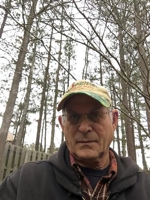
Daybreak in Atlanta
by Richard Lebovitz
Richard lives in the Upper Chattahoochee Watershed in the Georgia Piedmont. His small backyard is a National Wildlife Federation (NWF) Certified Wildlife Habitat and Georgia Native Plant Society (GNPS) Certified Native Plant Habitat, and he participates in GNPS rescues to save native plants from the path of development.

Rush hour begins in the city,
but no one is rushing.
Headlamps and taillights,
strings of pearls and rubies,
inch along in the darkness,
snaking through a maze
of crashes and construction.
As the sky lightens, the sun
peeks ghostlike through the mist, as it did
when the Blue and Gray skirmished here,
when Mr. Johnson’s ferry crossed the river,
when the Creeks camped in the woods,
hunting, fishing and gathering,
as did their ancestors
for thousands of years.
Under the bridge where we sit,
the timeless Chattahoochee
wends its way
from the mountains
to the sea.
© Richard Lebovitz
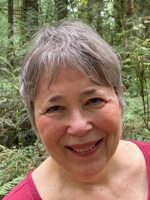
Battered
by Carol Raitt
Carol lives in the Puget Sound lowlands, bound on the east by the Cascade Range and on the west by the Olympic Mountains and Salish Sea -- home to sea stars, killer whales, and salmon.

When a black speck appears and then vanishes behind crashing waves I lift my binoculars and train them on the swells of a roiling sea. Bird? Diver? Seal? The rain-streaked windows of my Oregon cottage distort my view.
Three hundred yards due west breakers batter a ten-foot-tall basalt outcrop, a remnant from an ancient lava flow. During low tide it’s easy to believe the rock looks like a woman’s face in profile, gazing skyward. The locals call her Lady Face. Nature’s jewels ornament her crags and wrinkles—gooseneck barnacles, blue-black mussels, coralline algae. Ochre sea stars and aggregate anemones shelter in shallow tidepools near her base. Black oystercatchers and Western gulls probe exposed crevices for food. She is wildlife’s safety zone.
My husband was my safety zone.
Until Halloween 1990, when Sam collapsed at work and diagnostic tests revealed lung cancer that had metastasized to his brain. Sam was 48 years old. Two days later our doctor turned to him and said, “I’m so sorry, Sam. You have twelve months to live.”
Although Sam beat those odds his body and spirit could no longer stop the disease despite seven years of radiation, surgeries, and chemotherapy.
###
The mysterious black speck reappears. It’s a cormorant, a fish-eating bird. The cormorant bobbles like a bathtub toy, then slips under the waves. Something seems wrong. Cormorants dive underwater for prey, then rest on the water’s surface and extend their wings to dry them before diving again. When the bird resurfaces its wings look sodden and it struggles to stay buoyant. I pace the sunroom, chew on my ragged cuticle, and wonder if the cormorant will survive the storm or will I find it later, washed up on the beach? Dense, cinerous clouds draw a dark mantle across the sky.
###
In the mid-1980s, Sam and I dreamed of buying a vacation home on the Oregon coast—a place no more than a few hours’ drive from Seattle where our family and two mutts could be close to the sea.
In January 1986 we found our getaway in Cannon Beach, Oregon. Seventy-miles-per-hour wind gusts bowed the picture windows and roared through the roof shingles of the 50-year-old cottage while we stood with our realtor inside the sunroom and struggled to see the ocean beyond rain-blurred glass. Each creak and shudder sent a surge of excitement through me. I smiled at Sam. The place felt sturdy enough to survive another half century of storms.
Sam squeezed my hand. He was a fan of squally weather. He said storms reminded him of his Navy days at sea. We joked about how the cottage was a survivor. Scoured by weather and blowing sand, its exterior wood shingles were the color of mouse fur. Knotty pine interior walls glowed like amber honey. The smell of salt spray and seashells infused each room. I imagined our young daughter and her friends creating memories here like previous generations of children—racing from room to room, dripping seawater, tiny feet grinding wet sand into aging linoleum. The cottage was perfect.
###
Five years after Sam’s cancer diagnosis and fourteen months before his death we made our final visit together to Cannon Beach.
Relentless rain hammered Highway 30 foreshadowing worsening weather at the coast. Between swipes of wiper blades I counted mile markers and checked the time. Sam slept.
When we arrived, I unloaded the car, then we settled in to watch breakers crash over Lady Face. The storm’s fury matched the anger I leveled at the cancer attacking Sam’s body. Hailstones struck the window like flung pebbles. Fifty-mile-per-hour winds thrashed the foredune, bending beach grass and twig willow. I flung another log into the fireplace and watched burning embers ascend the chimney. Demonic sprites.
Sam’s frail body slumped into a wicker chair. The once-thick, strawberry blond hair I’d loved to touch was gone. Wispy gray strands sprouted from his half-bald scalp. Sharp cheekbones and shadowed hollows. Eyes too wide. Lips too thin. Skin that looked like it had been dipped in beige wax. He was 54 years old.
Between catnaps Sam reminisced about his Navy days, repeating words I’d heard before. Those four years in the Navy were among the happiest of my life. I’d forgotten most of Sam’s Navy stories, except one. Operation Dominic.
###
The cormorant struggles to keep its head above the breakers while waves push it closer to Lady Face. Wave after wave trounces the bird, dashing it against the rock, unlike anything I’ve seen. The bird looks weak, defeated, unable to rally from the storm. How did this happen? I’ve seen the outcome of weather or disease on hapless birds washed up, littering the tide line. Did those birds leave mates or young behind? Does this one? When the wave retreats the bird’s wings extend outward and upward. The cormorant struggles to climb the craggy rock but three rollers spill over Lady Face and the bird loses traction. One black wing disappears below the waves. Gone.
###
In 1962 Sam’s Navy service was ending. He was assigned to a ship stationed in the Pacific. During that time, our military conducted over thirty nuclear testing operations over land and sea. Operation Dominic was the military’s response to Soviet resumption of atmospheric nuclear tests. That spring, Sam’s vessel participated in a weapons effect test to evaluate how a nuclear blast would affect US ships within a target array between 1.5 to 2.5 miles from a blast site. After a Navy destroyer test-fired a nuclear weapon underwater the detonation produced a spray dome rising 2,100 feet into the atmosphere. As the dome dispersed it left a wide circle of foam-covered radioactive water that radiated eight miles from the blast site.
As Sam’s ship pitched and swayed sailors huddled below deck. The blast’s shockwaves loosened ceiling asbestos, showering the men in toxic dust. When the sailors got the “all clear” they were ordered topside, handed mops, and told to sweep the radioactive soup back into the sea.
For his part, Sam received a certificate with an image of a mushroom cloud and his name hand-lettered across the front. And when he received a cancer diagnosis at age 48, Sam joined the ranks of other Atomic Vets whose lives were shortened because of their exposure to elevated, unsafe levels of radiation.
###
When the storm passes I grab my jacket and walk toward the basalt outcrop, gladdened by blue sky, the low tide, and a glint of sunshine on a calmer sea. There is no sign of the cormorant. Bits of flotsam, strands of sea grass, and tiny, orange crab exoskeletons litter the beach. Keening gulls swoop low over the sand.
I zip my windbreaker and walk south. I imagine Sam beside me—salty, tousled hair, ruddy face smiling as he repeats Navy stories I’ve heard a dozen times. My thoughts return to the day, one year after Sam’s death, when our daughter and I carried his cremated remains to a quiet stretch of beach south of our cottage. We climbed atop a rocky remnant of an ancient lava flow exposed at low tide. Incoming waves swirled around us as we released Sam’s cremains into his beloved sea.
As the years pass I feel less lonely when I visit our Cannon Beach cottage. I’ve kept Sam’s yellow slicker on a hook near the door. His stunt kite hangs from the ceiling. My beach walks comfort me. I know that each incoming wave returns a part of Sam to me.
© Carol Raitt
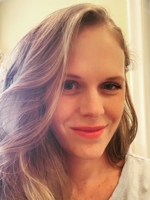
The Severed Tree
by Elizabeth Markley
Elizabeth lives in the foothills of the Appalachian Mountains a few miles from one muddy bank of the wide, winding Chattahoochee River.

Fir tree
In the living room
Outside, it is sixty-eight degrees in late December
(It is not supposed to be sixty-eight degrees in late December)
My children lie beneath the branches
Wonder in their eyes
Red and green lights whisper magic
They gaze up and miss
The trunk
Where the day laborer neatly cleaved
The Douglas fir from its roots
Laceration still sticky with sap
No need for the fire
(It is sixty-eight degrees in late December)
But we light it anyway
A sacrifice to the fire gods
Prometheus, Agni, Surtr
Enough, they say, the world is burning
I’m sorry, my babies
I think as I look upon the scene
Their future selves answer me
In the light of the severed tree
So are we
© Elizabeth Markley
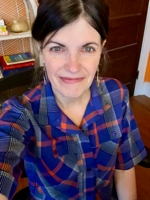
Palindrome Beginning and Ending with Lines from Jane Hirshfield
by Michelle Miller
Most weekends in summer, Michelle can be found with friends, kayaking the Duck River, one of the most biodiverse rivers in North America. This waterway contains several species of freshwater life, like the pearly birdwing mussel, found nowhere else on Earth.
The way the highwire walker must carry a pole to make her arms longer,
you carried me. I’ll carry you past the frozen pink hyacinth blooms,
weighted down and melting. Like soap made of glass,
from this distance, capitalism is
just killing insects. Here in paradise,
where the bee’s buzz lowers,
where the carcasses of birds
remain hidden,
soon we’ll be told
the blood of our daughters has begun to stain the snow.
The blood of our daughters has begun to stain the snow.
Soon we’ll be told
remain hidden,
where the carcasses of birds,
where the bee’s buzz lowers.
Just killing insects here in paradise.
From this distance, capitalism is
weighted down and melting. Like soap made of glass,
you carried me. I’ll carry you, past the frozen pink hyacinth blooms,
the way the high-wire walker must carry a pole to make her arms longer.

© Michelle Miller
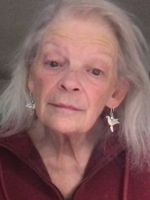
Global Warming Ode
by Elizabeth Libbey
Elizabeth lives in western Massachusetts on 40 acres of wildlife refuge.

Mild days, dodged snow-dumps, and birds singing Spring
before Valentine's Day make these old bones
love each tick of minute, day, love each step
out the door, love red rhubarb buds' push
into the pleasant chill of sun-drenched air.
These old bones—how happily each bone holds
the other like a lover, and makes
this skeleton a home for heart, lungs, spleen,
lets my sap flow the way the old maple's
veins release their sweetness under pressure.
Earth's a patient now, bleeding out under
pressure under my feet quietly while
I spend ticking hours tossing loose change
at some shallow wishing well. How happily
our fingers twine as one more day shuts down,
the wine's oaky taste of earth on our tongues.
As we sip, I wonder how much we can
live without until we are all that's left,
I wonder at how our hearts keep thumping
in our ears, wake up, wake up. What words might
be a tourniquet to stop the bleeding?
Keats' Ode to Autumn asks,
Where are the songs of Spring?
Lovers' Day, and the songs are here
lined along the maple's limbs.
What songs, what wings are missing?
What run of syllables across a page
can save? The sweet sap runs.
The days tick down. Tick down.
© Elizabeth Libbey

The Horses
by Ted Hughes (1930-1998)
From the early 1960s until his death, Hughes lived between Exmoor and Dartmoor in the small market town of North Tawton, Devon, England.

I climbed through woods in the hour-before-dawn dark.
Evil air, a frost-making stillness,
Not a leaf, not a bird,—
A world cast in frost. I came out above the wood
Where my breath left tortuous statues in the iron light.
But the valleys were draining the darkness
Till the moorline—blackening dregs of the brightening grey—
Halved the sky ahead. And I saw the horses:
Huge in the dense grey—ten together—
Megalith-still. They breathed, making no move,
With draped manes and tilted hind-hooves,
Making no sound.
I passed: not one snorted or jerked its head.
Grey silent fragments
Of a grey silent world.
I listened in emptiness on the moor-ridge.
The curlew's tear turned its edge on the silence.
Slowly detail leafed from the darkness. Then the sun
Orange, red, red erupted
Silently, and splitting to its core tore and flung cloud,
Shook the gulf open, showed blue,
And the big planets hanging—
I turned
Stumbling in the fever of a dream, down towards
The dark woods, from the kindling tops,
And came to the horses.
There, still they stood,
But now steaming and glistening under the flow of light,
Their draped stone manes, their tilted hind-hooves
Stirring under a thaw while all around them
The frost showed its fires. But still they made no sound.
Not one snorted or stamped,
Their hung heads patient as the horizons,
High over valleys, in the red levelling rays—
In din of the crowded streets, going among the years, the faces,
May I still meet my memory in so lonely a place
Between the streams and the red clouds, hearing curlews,
Hearing the horizons endure.
© Ted Hughes (1930-1998)
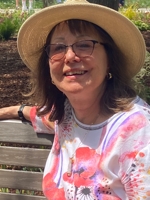
Shoveling Snow in the Driveway
by Maryfrances Wagner
Maryfrances lives in a town on the outskirts of an urban area in the Midwest. She has two adopted feral dogs that she walks along the Little Blue Trace trail every day, and every day gives her gifts--a buckeye, a tiny toad hopping by, a pawpaw, blue herons heading to their rookery, deer weaving through the trees, geese sitting in a grassy knoll, a hatchling redneck, and the changes of the season with fall the most glorious of all, providing an abundance of red, yellow, purple, brown, and all the shades in between.

I like to go out before it stops snowing
so I can push snow instead of lift it.
Over and over, I make my way down,
watching it heap at the sides,
and when it snows, air is different.
A voice hangs like a smoke ring,
before dropping through sky with other
quiet voices traveling through space.
When I look up, I fly,
spinning in an upward fall until there is
no separation between space and white sky,
and snow clumps on my coat and lashes
as it piles and piles in near silence. Once I’ve
made my way down the driveway, I start over,
pushing and pushing, coming back out
for second and third rounds until the snow
stops, and the clang of shovels
echoes down the street, all of us waving,
bundled up in solidarity, but I want to tell them
they’ve arrived too late to see the show.
© Maryfrances Wagner

Like Frozen Iguanas in Winter
Like frozen iguanas in winter, Florida has walking catfish during hurricane season
—Florida Today, August 5, 2024
by Ginny Lowe Connors
Ginny lives in the Connecticut River Valley. The name Connecticut comes to us from the Mohegan word quinetucket and the Nipmuc word kwinitekw, meaning “beside the long tidal river.” In her neighborhood Ginny can walk to and along the greenway near Trout Brook, where she watches waterfowl, occasional eagles, and other species that thrive near this quiet waterway. She has seen neither iguanas nor walking catfish there, however.
A woman on Merritt Island asks her friends,
Do you have a yard full of catfish? She’s counted 14
on her lawn and one on her welcome mat.
Last year, a winter freeze, iguanas dropping from trees,
stunned, immobile, but still breathing. And now this.
A neighbor sloshes over. Yeah, they’re walking catfish.
They watch the fish hump and wriggle toward deeper water.
They can breathe air and—sort of—walk.They’ve learned to adapt.
The woman tells him they’re thinking of moving,
but where can we go? The horizon wavers—yellow, green.
Air smells like smoke. Truth is, we’ve done this to ourselves,
the neighbor says. She shakes her head.
Like the iguanas, she’s stunned.

© Ginny Lowe Connors
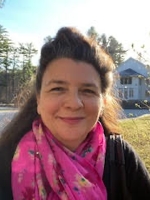
On Flourishing in Winter
by Heather Sellers
Heather makes her home in wetlands near the Hillsborough River in the Lower Cypress Creek, Trout Creek, and Hillsborough watersheds which contain 344 lakes, 88 rivers, two named bays and many estuaries. Alligators walk and swim through the cypress stands and waterways here where bobcats, rabbits, wild pigs, snakes, and a stunning variety of insects, along with the only bird endemic to Florida, the scrub jay, make their homes.

I have never been able to throw away seeds or gods
or letters or things made by children
or even the frazzled, desiccated porch orchid down to a dusty
stalk with dried-out root-strands. She might live!
Today, late December, cleaning the laundry room,
I found an old envelope marked Bekana seeds.
I set the tiny seeds on moist soil in the old pots on the patio,
pots vacant for months, relieved to be far from the humiliation
of summer: petunias. I covered the tiny seeds
with their own dark cool territory and we were now
together in an insurgency, a saving.
And on the third day beaks of white pierced the black,
and a week later, on the cold solitary last day of the year,
I woke to find a festival of miniature green umbrellas on the dirt circles,
visibly humming. I pulled up a chair, listened to growth itself.
I watched the early leaves open, green leatherette book covers
inscribed by light. First true leaves come as wrinkled urgent spoons,
swing, flash and wave. This is our interdependency.
These are my oaths and salads. Given the right conditions,
transformation cannot be stopped. A garden is the opposite of a hospital.
My grip is on the green. It’s work. Every day, I drag the pots
across the patio, into the next hour’s lone spear of sun,
before the gleaming rectangle of light slides off into the dark.
And in this way I grow, too, every day, maybe stronger.
© Heather Sellers
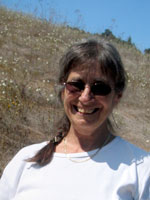
First Betrayal
by Alicia Ostriker
Alicia lives in Manhattan Valley, formed by an east-west slash in the granite bedrock that goes downhill from Central Park west to the Hudson River. A stream once flowed down it; now wind from the river funnels up.

Remember back to then
O we were never behaving children
We stood and watched as all
The sky came down, like a white wall
Tumbling slowly
Ate apples in the snow
And stood and laughed. How could we know
We hung upon a crust, a dust, this place
A pebble pinned in space
O children, mind,
Infinity has driven angels blind
With whiteness, and they fell
Twisting, tearing their sky-speared eyes; and hell
Was limitless, the demons fall forever
Fall white, cease never
Foolish, we never guessed
Deceit, but always thought the snow was blessed,
As if the earth were solid and had roots,
We stood so steadfast in our shiny boots.
© Alicia Ostriker

Lament for the Fog
by Gail Comorat
Gail lives on the Delmarva Peninsula, a coastal area nestled on the Atlantic Ocean. She often heads north with her favorite person to camp and hike in the Delaware Water Gap.

I.
I welcome this morning fog that blurs
ocean and sky
into a seamless gray landscape.
The world I know, erased. This is the time
my ghosts slip in—the most insistent,
my brother. Scientist, nature lover,
he walks free of his other life
to sit beside me on the dunes.
II.
Sea-fog shrouds us in nostalgia. I remember again
the depth of his voice, the cherry scent
of his pipe. How is it I keep forgetting
the brownness of his eyes? Every day
he fades farther away as I walk through my own fog
searching for lost keys buying deodorant pairing my husband’s socks
His visits come only in this mist he called la niebla
My brother is gone
and the world spins with less certainty
III.
Scientists say climate change is decreasing coastal fog.
On the west coast, fire risk increases.
Here, there are no fires
but I am given fewer days of the fog
that allows my brother’s visits. And when he appears
his uneasy spirit prods me
to move beyond my loss of him
his voice asks me
what else might I lose
what am I willing to lose
IV.
socorro Spanish word for rescue
as a boy he fell easily into that language
speaks to me now only in Spanish
his tongue caressing the words
he tells me socorro also means hope
V.
of course we still toss plastic into the sea
of course oceans keep rising
of course trees keep burning
of course glaciers keep melting
and what have I done to protest except to say
I lost a sibling
but soon I could lose
this place he loved most this beach
and its precious morning haze
VI.
(Que estas dispuesta a perder, hermana?)
VII.
climatologists say three hours of fog are lost per day
along coastal California
without fog
there will be no redwoods
no salmon
fires burn in California
VIII.
slang: up in smoke
to disappear suddenly and completely
vanish
IX.
Everything is momentary (the ordinary
fog that brings my brother)
even the glaciers and redwoods
(the language of grief itself:
What are you willing to lose, sister?)
on a day like this a day that will become an immaculate blue
am I willing to walk away to leave the comfort
of my brother’s brief company
am I willing am I hopeful enough to rescue one small thing
X.
I ask the fog
where do I begin? what is precious enough to save?
© Gail Comorat